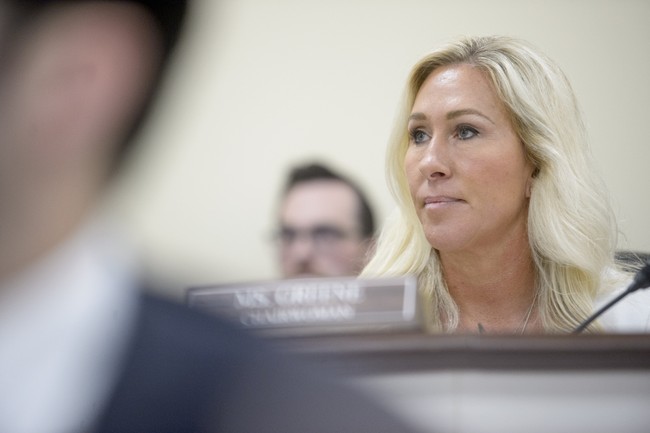
In a move that has sent ripples through Republican circles, Rep. Marjorie Taylor Greene, a prominent MAGA figure and staunch ally of President Donald Trump, has announced she will not pursue a U.S. Senate run in Georgia for 2026. Her decision, shared in a fiery social media statement on Friday night, raises serious concerns about the direction of the Republican Party and its ability to unify for critical midterm elections. As a concerned observer, I worry that Greene’s criticisms of the GOP and Georgia Republicans and the Senate itself signal deeper divisions in Georgia that could jeopardize the GOP’s chances against a vulnerable Democratic incumbent, Sen. Jon Ossoff.
🚨New: Marjorie Taylor Greene has announced she won’t run in the 2026 Georgia Senate Race pic.twitter.com/yTxKAva8qD
— The Calvin Coolidge Project (@TheCalvinCooli1) May 10, 2025
Greene, who represents Georgia’s reliably conservative northwest district, didn’t hold back in her announcement. While she took swipes at Ossoff, calling him a “silver-spoon progressive” detached from everyday struggles, her sharpest critiques were aimed at the GOP establishment like the ones in Georgia and in the Senate’s. She described the Senate as a place where “good ideas go to die,” arguing that its 60-vote threshold and internal Republican resistance stifle meaningful change. “The Senate doesn’t work,” she wrote. “It’s designed to obstruct the will of the people and protect the Uniparty’s grip on power.” Her words echo a growing frustration among conservative voters who feel betrayed by a party that campaigns on bold promises but often fails to deliver.
What concern me the most is that Greene’s scathing indictment of her own party. She accused fellow Republicans of being beholden to wealthy donors and consultants who prioritize personal gain over the public’s interests. She criticized “Republican Senators” who consistently vote against key legislation and dismissed polling as “dishonest.” Her attacks on the “elites” and “consultants” who she claims undermine the party’s base reveal a rift that could fracture the GOP’s unity at a critical moment. With Ossoff seen as a prime target for Republicans aiming to expand their 53-47 Senate majority, Greene’s decision to step back—and her warning to the establishment—suggests a party struggling to align its populist energy with its traditional power as structures.
Thank you @mtgreenee for demonstrating character by declining to run for Senate because you placed the interests of your constituents and your party ahead of personal ambition. You deserve a lot of credit and respect for setting this powerful example. Plus, in doing so, you’ve… https://t.co/fI7YvXFZp3
— Kurt Schlichter (@KurtSchlichter) May 10, 2025
Greene’s announcement follows closely on the heels of another blow to GOP hopes: Gov. Brian Kemp, a popular conservative and the party’s top Senate recruit, also declined to run. Kemp’s decision, combined with Greene’s, leaves the Republican primary field open but uncertain. Rep. Buddy Carter has already launched a campaign, and other Georgia Republicans, including Reps. Mike Collins and Rich McCormick, are considering bids. A crowded and contentious primary looms, which could further expose the party’s fault lines and weaken its general election prospects.
Thank you. This more than anything wins my respect for you. I wish this were different world, but it is what it is.
— DataRepublican (small r) (@DataRepublican) May 10, 2025
As a guy who is a little worried about the GOP’s future, I find Greene’s message compelling. Her claim to be “effective, fearless, and relentless” in serving the American people resonates with many frustrated voters. Though I’m surprised that her refusal to “fight for a team that refuses to win” and her parting shot at the establishment—“consider this your warning”—suggest a willingness to burn bridges without a plan. This approach may energize her base but risks alienating moderates and independents GOP that she needs when running for the house.
Greene’s statement also left the door open for a potential gubernatorial run in 2026, a race to succeed the term-limited Kemp. Her ambiguity about her next move only adds to the unpredictability surrounding the GOP’s strategy. Will she continue to wield her influence as a disruptor, or will she pivot to a broader leadership role? Either way, her decision not to run for Senate underscores a strange reality: the Republican Party National and in Georgia is at a crossroads, grappling with how to harness the passion of its MAGA wing while maintaining the discipline needed to win competitive elections.
As the 2026 midterms approach, I feel a bit uneased that the Georgia GOP’s internal divisions, laid bare by Greene’s announcement, could squander a golden opportunity to defeat Ossoff and strengthen the Senate majority. The party must find a way to bridge its populist and establishment factions, or risk ceding ground to Democrats in a state that has become a political battleground. Greene’s voice will undoubtedly remain a force, but whether it unites or divides Georgia Republicans will shape the party’s path forward. For now, her decision serves as a wake-up call—one the GOP nationally or in Georgia cannot afford to ignore.
















